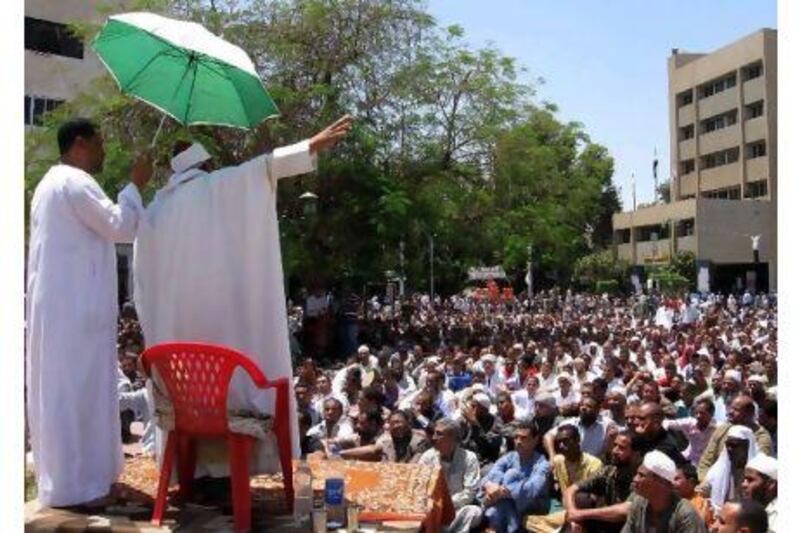Egypt's Islamists had been suppressed for decades, seen as the most serious threat to the regimes of Hosni Mubarak and his predecessors Anwar Sadat and Gamal Abdel-Nasser.
Now that Mr Mubarak is gone, the Islamists are enjoying freedoms they could only dream of three months ago.
The Muslim Brotherhood, the largest and best organised of the Islamic groups, is setting up a political party, launching its own newspaper and satellite television channel. The ultraconservative Salafis are looking into creating a party and are waging a hearts-and-minds campaign across much of Egypt to show that there is more to them than long beards and a rigid interpretation of Islam's teachings.
The Gamaa Islamiya, which fought the Mubarak regime in a protracted insurgency in the 1990s and plotted Sadat's 1981 assassination, is structuring its support base along the lines of modern political organisations, holding elections for members of provincial leaderships and a national council.
While the Islamic groups have publicly stated their intention to take advantage of the new freedoms to enter politics, they have not said whether they intend to try to turn Egypt, a nation of more than 80 million people, into an Islamic state.
Several leaders of the Brotherhood spoke recently of installing an Islamic state in Egypt and of the implementation of Sharia punishments such as the amputation of hands for repeated theft and flogging for drinking alcohol. Others in the group's leadership hurriedly sought to distance the group from the comments, saying they did not reflect the organisation's thinking.
One thing is certain, though. If Islamic groups decide to run on a unified ticket in legislative elections scheduled for September, they could win a slight majority of the seats.
The Brotherhood, which has fielded candidates as independents in the past, won 20 per cent of the legislature's seats in elections in 2005, their best showing ever and evidence of their strength. In elections held last November and December, they failed to win a single seat due to widespread fraud orchestrated by Mr Mubarak's ruling party.
The Brotherhood has sought to allay fears of an Islamic takeover by repeatedly saying it would only contest about 30 per cent of seats in the September elections. It also says it will not field a candidate in presidential elections due late this year.
But these assurances have done little to calm the nerves of the country's majority of moderate Muslims, secularists and minority Christians who fear that the success of the 18-day uprising against Mr Mubarak has empowered some of the most radical Islamists.
The Salafis are thought to be the most worrisome.
For years, the Mubarak regime tolerated, and in some cases encouraged, the Salafis to counter the weight of the Brotherhood. That tacit support allowed the Salafis, who seek to emulate the lifestyle of early Muslims, to grow. In exchange for that support, the Salafis stayed away from political activism, rejecting democracy because it replaces rule by God's law with the law of man.
But the overthrow of Mubarak's regime appears to have given the Salafis impetus to push their beliefs.
Authorities blamed the Salafis for the destruction of at least five religious shrines in the Nile delta region north of Cairo last month. The actions mirror their belief that venerating shrines is idolatry. They also threatened to do the same to major shrines in Cairo belonging to members of the Prophet Mohammed's immediate family, something that prompted the country's top Muslim cleric, the grand imam of al-Azhar, Ahmed al-Tayeb, to warn of a bloodbath.
Elsewhere in Egypt, the Salafis have been targeting liquor stores, Christians and suspected brothels, taking advantage of a persistent security vacuum and trying to act as the enforcers of Islamic law.
During the past week, they led protests in the city of Qena against the appointment of a Christian governor, blocking rail lines to Cairo and to Aswan and laying siege to the local government's building.
Repeated mediation attempts had failed until the prime minister, Essam Sharaf, on Monday defused the crisis by "freezing" the new governor for three months during which the local government's top bureaucrat would run the province, a clearly interim measure until a permanent solution is found.
Maj Gen Mukhtar al-Mallah, a member of the military's Supreme Council, which has ruled Egypt since Mr Mubarak was deposed, recently told newspaper editors that the army "will not allow extremist groups to take over Egypt". He expressed his concern about the actions of the Salafis, but also said no groups can be excluded from the political scene, "whether they are Wahhabis, Salafis, Muslim Brotherhood or Christians".
A referendum last month provided an early exercise for Islamists at the polls. The Brotherhood and Salafis pushed hard for a "yes" vote on a raft of constitutional amendments, some of them claiming that it would be a "yes" for Islam. Many liberal protest leaders opposed the amendments, saying they wanted greater changes. The amendments passed by 70 per cent.
But the results give hints of a realistic measure of the Islamists' weight.
Out of Egypt's 45 million eligible voters, 14 million voted "yes". But the majority of those approved the changes because they saw the amendments as bolstering stability, not because they support the Brotherhood or the Salafis. That, some analysts argue, suggests that the core support enjoyed by religious groups ranks only in the several millions and that the bulk of the electorate is not in their camp or up for grabs.
[ foreign,desk@thenational.ae ]






